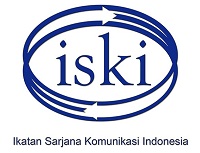The Effectiveness of Interpersonal Communication Through Coaching Method For Employee In RSUD R. Syamsudin, SH
Abstract
In the era of globalization marked by intense competition between hospitals, it is necessary to anticipate an increase in service quality on an ongoing basis in line with higher customer expectations for hospital services. Top management of RSUD R. Syamsudin, S.H. Sukabumi City has determined the policy of coaching method as a mean of interpersonal communication among the leader and staffs to increase the motivation and as part of the staff development efforts, since nowadays the hospital staffs are required to have high motivation to work to perform in health service. The purpose of this study was to determine how the effectiveness of interpersonal communication affects the success of the coaching method. This research was conducted using a qualitative descriptive method. Data were collected through in-depth interviews with two coaches and one coachee. The results showed that the effectiveness of interpersonal communication in the coaching method affected the success of the coaching process. Openness is marked by the coachee's willingness, to be honest, and open with the coach, empathy is carried out by active listening and clarifying, a supportive attitude is carried out through self-disclosure and powerful questions, a positive attitude is carried out by building trust and acceptance of positive thoughts and equality which is marked by eliminating the position subordinate superiors and the form of conversation in the form of dialogue and discussion.
Keywords
Full Text:
PDFReferences
Anaomi. (2014). STRATEGI KOMUNIKASI PERSUASIF HUMAN RESOURCES DEVELOPMENT DALAM MENYELESAIKAN KONFLIK KARYAWAN PT. DIMAS DRILLINDO CABANG DURI PROVINSI RIAU. Jurnal Online Mahasiswa.
Bacal, R. (2012). Performance Management. Gramedia Pustaka.
Bajari, A. (2017). Metode Penelitian Komunikasi. Remaja Rosdakarya.
Danim, S. (2012). Motivasi Kepemimpinan dan efektifitas Kelompok. Rineka Cipta.
De Vito, J. A. (2011). Komunikasi Antar Manusia. Kharisma Publishing Group.
Effendy, O. U. (2014). Dinamika Komunikasi. Remaja Rosdakarya.
Griffin, E. M. (2012). A First Look At Communication Theory Eighth Edition. The McGraw-Hill Companies, Inc.
Kurnia P. (2012). Coaching Yang Menumbuh-Kembangkan (Pionir Jaya (ed.)).
Kuswarno, E. (2001). Efektivitas Komunikasi Organisasi. Mediator: Jurnal Komunikasi.
Liliweri, A. (2015). Komunikasi Antar Personal. Prenadamedia Grup.
Lutfi, F. (2008). Teknik-Teknik Komunikasi Untuk Konselor. UPTBK UM.
Maharani, D. (2018). Manajemen Komunikasi pada Petugas Kebersihan Kota Palembang. Mediator: Jurnal Komunikasi, 11(1), 119–128. https://doi.org/10.29313/mediator.v11i1.3267
Moleong, L. J. (2010). Metode Penelitian Kualitatif. Remaja Rosdakarya.
Munthe, R. G. (2015). Menerapkan Coaching Sebagai Gaya Kepemimpinan Masa Kini. Jurnal Manajemen, 14(2).
Potu, A. (2013). Kepemimpinan, Motivasi dan Lingkungan Kerja Pengaruhnya Terhadap Kinerja Karyawan Pada Kanwil Ditjen Kekayaan Negara Suluttenggo Dan Maluku Utara di Manado. Jurnal Riset Ekonomi, Manajemen, Bisnis Dan Akuntansi, 1(4). https://doi.org/10.35794/emba.v1i4.2894
Prawira, P. A. (2014). Psikologi Pendidikan dalam Perspektif Baru. Ar-Ruzz Media.
Rakhmat, J. (2012). Psikologi Komunikasi. Remaja Rosdakarya.
Salim, G. (2015). Effective Coaching. Bhuana Ilmu Populer.
Sunarto, S. (2008). Pengaruh Komunikasi dan Motivasi Kerja Aparatur terhadap Kualitas Pelayanan sertifikat Tanah. Mediator: Jurnal Komunikasi, 9(2), 403–414. https://doi.org/10.29313/mediator.v9i2.1124
Whitmore, S. J. (2017). Coaching for Performance; Principles and Practice of Coaching and Leadership. Nicholas Brealey Publishing.
DOI: https://doi.org/10.29313/mediator.v14i1.7022
Refbacks
- There are currently no refbacks.

This work is licensed under a Creative Commons Attribution 4.0 International License























